by crossriverwatch admin
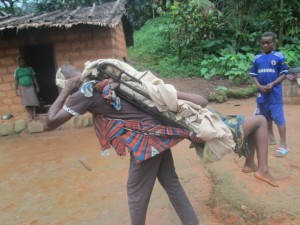
…Belekete, the forgotten community with no access road, schools, adequate health center
The popular aphorism that says “the journey of a thousand miles begin with a foot step” is true. Indeed, the journey on foot to Belekete, a forgotten community in Cross River State could be regarded ironically as a journey of a million miles, located in a remote part in Obanliku Local Government Area, hosting one of Nigeria’s renowned tourist attractions, Obudu Ranch Resort. No one needs a special introduction of the Resort, it is beautiful and alluring, life there is comfortable and luxurious but Belekete is the opposite of all these features. Life in Belekete is turbulent and Hellish it is a jungle hub.
Facts about Belekete
Belekete is a remote community where one needs to travel on foot for eight hours or thereabout from the ranch. For a visitor embarking on the journey, it requires adequate preparation. You must be well kitted before taking the ‘risky’ journey, advisably with food, umbrella, water, torch light, a guard and possibly mat where one could lay if darkness covers or when the bones are stressed up.
The community is automatically cut off from the rest of other Ranch communities. No access road, schools, adequate health center, electricity, pipe borne water and Global System of Mobile (GSM) Telecommunication. In short, no amenities that one enjoys elsewhere in the state could be found there.
In Belekete, it is hard to believe that the world has turned into a global village. Diseases are rampant, old and young die incessantly, expectant mothers also die from complications during labor. You can imagine travelling on foot to another community in the same local government council for eight hours. It is really incredible but it is true, living in Belekete is like living in ‘doom.’
The reporters’ journey to Belekete
Now the journey to Belekete has just begun, it all started at 12 noon, penultimate week when our reporter went in search of the ‘hard to, sorry, impossible to reach area in the state. Belekete was the first place recommended by some elders who perhaps, had fair knowledge of these kinds of places.
The weather in the hilly area is incomparable to any part in the country; always clouded with snow with severe cold, climbing three, hills with steep valleys, walking through thick forests and crossing rocky streams with forceful flow, there are wild animals including snakes and Antelopes in short, no visitor had ever gone there that comes back.
The Ranch residents did alert this reporter but he took the ‘risky’ journey, heading for the kill…jungle, jungle, jungle here I come. Ok, let’s go to Belekete said the reporter to curious youths who stood on top of the mountains. There came a thunderous shout from members of the Ranch community, “No Bros you no go reach, no even waste your energy.” They trooped out in large number from their homes to watch the reporter descending the first hill some few kilometers away from the Ranch. It was a beat of farewell to an unknown destination from them.
Before embarking on the journey, fervent prayers were offered by this reporter because it takes the grace of the Almighty God go there and return safely as the Ranch residents earlier warned but it was part of the hazard faced in the journalism profession.

However, there, on the first hill there were no tress rather only grass land due to government ban on the community from cutting any tree in the Ranch premises. They had cut all the trees and probably used them for fire wood. It was a sort of worry as fear gripped this reporter’s mind, thought-provoking and rhetorical questions came to bare. If one mistakenly sleeps his foot on this sleepy hill where would he waged himself? No answer.
Though, it was a lucky day for this reporter as some indigenes of Belekete who schooled in the Ranch were heading back to their homes for weekend; they were four in number including a visitor.
One of the students who gave her name as Unity Ajia 17, a JSS1 student of Bebi Technical Secondary School in Obanliku, accepted to serve as guide to this reporter though in company of her colleagues who were also going for weekend. The team was empowered.
Barely 45 minutes descent from the first hill, one person returned, guess who? A visitor, a colleague (reporter) who works with one of the electronic media in the state; he could not continue the journey neither being able to climb back the hill to the Ranch. The youth were immediately alerted from the far distance, two staunch looking young men rushed to the scene, they said: “we told you earlier that you cannot cross the first hill you paid deaf ears look at the repercussion, we are not going to carry you on our back for free. Climbing alone is tedious not to talk of carrying a load on the back, a mature man for that matter,” the youths complained. They however demanded a fee of ten thousand naira and later reduced to five thousand after a long bargain and pleas from the handicapped man. That was the end of his journey.
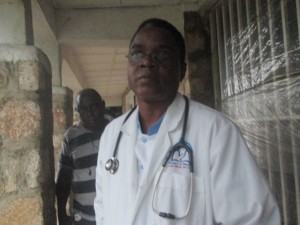
The rest of this reporter’s entourage initiated an idea; it was an intelligent one, everybody was advised to look for a supporting stick or call it walking stick to serve as friction while descending the sleepy hill, there were deep valleys and nobody dares the narrow foot-paths.
After a short distance walk, a pregnant woman was cited climbing one of the hills with a pig; her destination was the Ranch where she could sell it and buy some food stuff including medicine, seasoning (magi), salt, and other domestic items which could not be gotten in her community. In Belekete there are no markets where one could buy salt and (spices).
Right there, this reporter’s job started a top the hill, it was part of his mission to find out how residents of Belekete community fared, and the midgets were brought out from one of the bags held by the student guide. At that point, everybody was already exhausted including the pig carrier as legs were vibrating after a herculean walk. She accepted to speak swiftly with this reporter, she said “my name is Patience Ajagba, I am 20 years old I come from Belekete, I am heading to the Ranch to sell my pig so that I can buy maggi, salt, onions, and English medicine to take because I am sick I have taken herbs for a long while but there are no changes in my health condition.” When this reporter went further to ask more questions, Patience declined saying, “please I am in a hurry I want to rush and meet up with my customer as you can see we are suffering in that place, please go and see things for yourself. Thank you sir,” she said.
However, judging from her appearance she looked older than her age due to fatigue and probably poor living condition, Poverty was written all over her face, scales on her legs. It was obvious that she was really sick and was on her way to sell the commodity (pig) to purchase some drugs even as she could not afford antenatal care. The next question the reporter threw to her as she made her way on top of the hill was “Paddy, are we approaching your village”? She replied and said “you still have a long way to go but just keep moving,” those were the words of encouragement from her.
The journey lasted for eight hours; the food (banana) was finished on the deadly road, but not for the young student (Unity), who volunteered to serve as a guide, no one could have located a stream inside the forest. In the forest there was no calabash, not even a leaf to at least scoop water from a very small and shallow pit. There was a miracle in the forest as a hair relaxer container was picked by one of the sojourners. It was used to scoop water from the shallow pit to soak the small garri a villager donated for the trip.
At that point, this reporter thought of the popular eateries, Mr. Biggs and Crunchies fried rice and chicken back in Calabar the state capital were he visited some couple of weeks ago. Indeed, ‘there is God’, a miraculous God who led Moses to sojourn through the wilderness with the Israelites into the promise land.
On arrival to the first community, called Oshenokpa in Belekete 1, nobody had died, though the journey was rough, the villagers trooped out from their thatched houses to welcome this reporter. Their houses were nothing to write home about, there were few buildings with so many inhabitants, their compounds were like burying grounds or call it grave yards, tombs every corner. No good drinking water but one had to managed their water to quench the thirst, the fear of contracting cholera was no longer there it was survival of the fittest in the ‘jungle’.
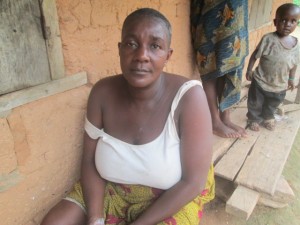
Besides, it was a sign of relief at that point that at least one has seen roof tops either thatched or zinc. Walking to another neighboring village took several minutes and passing through forests.
Shortly, here we come it was the compound of the Clan Head of Belekete, Chief Ogweshi Francis Ngweli, his Community Relations Officer, Ignatius Achue, hurriedly went inside his house to alert him that they were visitors looking for him, he came out from his small hut though it was late, around 8pm. Everyone was exhausted but a brief introduction was made and the Clan Head who had stroke was highly elated on the mission of this reporter.
After a brief interaction at that night with some youths in the community, it was observed that the people’s dilemma and need was road and healthcare facilities as herbs were the only alternative to their health challenges.
They had two healthcare centers with inadequate facilities and man power. Only one staff and a volunteer and both of them live in the ranch. No health worker accepts posting to the interior village. The people had devised a means of conveying sick and expectant mothers to the ranch during serious health problems.
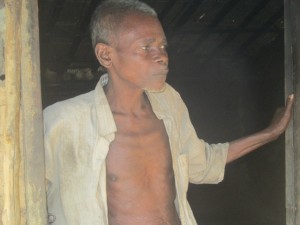
They had weaved some long baskets with strong ropes by the sides, every compound has their own where they put a sick person and hang it on their back to the ranch. Hardly before sick persons survive on that eight hours journey to the ranch. In short, they all die on the way and their corpse taken back to the village for burial. This was the short ‘tales by moonlight’ snippets from the youths.
However, at that point It was already late, darkness had engulfed the cloud as the Clan Head could not converged his people for interview rather he went in search of a mattress were one could lay his head, food was served, guess what? It was parboiled rice grinded in a mutter and was well cooked with palm oil sauce, no meat, fish, onion or maggi but there was little quantity of salt; appetite for food immediately was lost.

All through the night this reporter could not sleep as thoughts were running deeply. The thoughts were not far fetched but all tilted towards the next days’ eight hours journey.
Perhaps, the next morning the interview started, the Clan Head, Chief Ogweshi Francis Ngweli while speaking with this reporter said: “there have been unprecedented deaths because we don’t have healthcare centers here we don’t have assistance of carrying our people with complicated health issues to the ranch for treatment where there are good hospitals. Pregnant women and children have been dying. I am sure you have seen it with your two naked eyes the number of graves in our compounds and for the eight hours you have walked to get to this place. We need facilities. The only health officer we have here, if anything takes him out that means we would not even have anyone to attend to us.
When this reporter asked the Chief of his community population he said, “I don’t know the exact population of this community because as our women give birth regularly so also they and the children die. We don’t take records of all these because of the pains we are into. We have appealed to the government but because there is no motorable road, the government has not been able to give us some sort of assistance. We are pleading they should help us. The place is so backward in the sense that there is no road. There is no pipe borne water and we back our people who are sick all the way to the ranch. And because of that we wish the government to help us with an access road and assist us with adequate health facilities.”
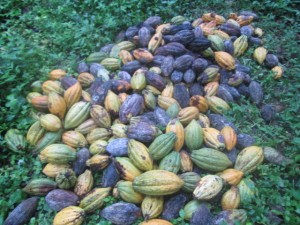
Another respondent, Chief Achagba Augustine, 45, indigene of Belekete who is in-charge of one of the healthcare centers says he holds a National Diploma in Community Health with over 21 years in active service. He said: “Belekete is a ranch community and it gave out the ranch to government and that is the reason they kept off the place, allowing the place to be managed by government, that is why they are inside that hole and I also come from that interior place though I live in the ranch our community is really lacking behind, we have no roads and we don’t have man-power to keep the health facilities working. We don’t have enough drugs and equipments. The two health facilities we have are not well-equipped and up to standard and we don’t efficiently carry out our health services the way we were taught to do in our various schools of health science. We would be very happy if the government would intervene especially in area of road construction and the employment of staff and equip them.
“Pregnant women die frequently in the process of them laboring to deliver and our people have devised a way of conveying them to up the ranch where there is equipped hospital but they die on that far distance road as you can see it takes seven to eight hours walk to the ranch. There is this long basket we had weaved which we uses to carry pregnant women and sick people with serious health problems, it is made up strong robes we hang it on the neck or shoulder as the woman or sick lay with stomach facing up, it is really a herculean task carrying such a heavy load and climbing mountains and crossing big streams.
“When Policemen come here to keep peace, during crisis or conflict at the end of the day, we have to carry them on our backs to bring them back to the ranch. Even as you have come we are not sure you would reach and go back on your own without being carried, I tell you, even as you are staunch-looking, when you are exhausted on the hill top you have nothing to do than to seek for an assistant to carry you on the back. The government should look into our problems as it concerns me too as an indigene, especially health wise. The people are dying. No vehicle can get to the place, not even a bicycle. We just attend to antenatal patients and treat minor ailments during immunization we travel to the big hospital in the ranch and collect vaccines to give to the people there, the stress is too much I would say that myself and colleague who is a volunteer, the philanthropic service we render cannot quantify what government give to us.”
The medical doctor in charge of the ranch hospital, Dr Augustine Oshie said: “the truth of the matter is that we don’t have access road to go in there and treat sick people. There is increasing rate of infant mortality in Belekete. I remember when I came here newly, somebody was carried on a head stretcher to the health facility but as soon as they entered the emergency room the person died. If there was a road network I tell you that person would not have died. Once you are able to come to the health post we attend to you and for those that are trapped in the middle of the forest we find it difficult to go in there and treat them. Just as what you have seen, that is exactly what we pass through in carrying out immunization. All we need is access road so that lives can be saved. If we have the road network the ambulances that are available would meet up to their health needs though there have been synergy between community heads and health workers as the people sometimes come over to carry immunization on their head to the community but that is not enough we need a good road to reduce the number of deaths that occur in Belekete.”
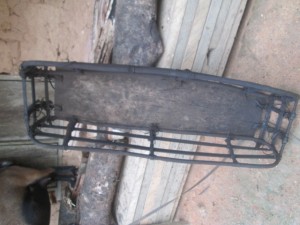
Also, Tawo Santos, 30, farmer said: “we feel rejected by the government even as we exercise our franchise during the general elections. Our people always come out en masse to vote from presidency, governor, and all elective positions but our elected leaders do not remember us. We thank you the media for coming to see and hear our plight please take the message to the government because we are voiceless, tell our leaders that we are really living in bondage right here in Belekete.”
Pa Philip Irishie, 75, who this reporter cited sitting in a weaved bed inside his hut was in a critical health condition, he lamented further in an emotion laden tune “Please we are suffering let the government come to our aid. We need road, please we need help our people are dying every day like chickens.”
On her part, Mary Keche, 36, said “please we need help, diseases are infecting us on daily basis, our herbs cannot cure us any longer let government give us road and good health facilities.”
follow us on twitter @crossriverwatch
Since You Are Here, Support Good JournalismCrossRiverWatch was founded on the ideals of deploying tech tools to report in an ethical manner, news, views and analysis with a narrative that ensures transparency in governance, a good society and an accountable democracy. Everyone appreciates good journalism but it costs a lot of money. Nonetheless, it cannot be sacrificed on the altar of news commercialization. Consider making a modest contribution to support CrossRiverWatch's journalism of credibility and integrity in order to ensure that all have continuous free access to our noble endeavor. CLICK HERE |
New Feature: Don't miss any of our news again.Get all our articles in your facebook chat box.Click the Facebook Messenger Icon below to subscribe now
Text Advert by CRWatch :Place Yours

Will You To Learn How To Make Millions Of Naira Making Special Creams From Your Kitchen?.Click Here
Expose Your Business And Make More Sales. Advertise On CrossRiverWatch.com Today




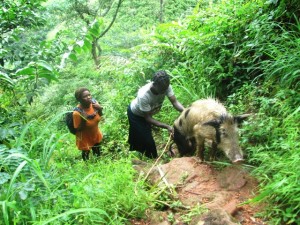
Leave feedback about this